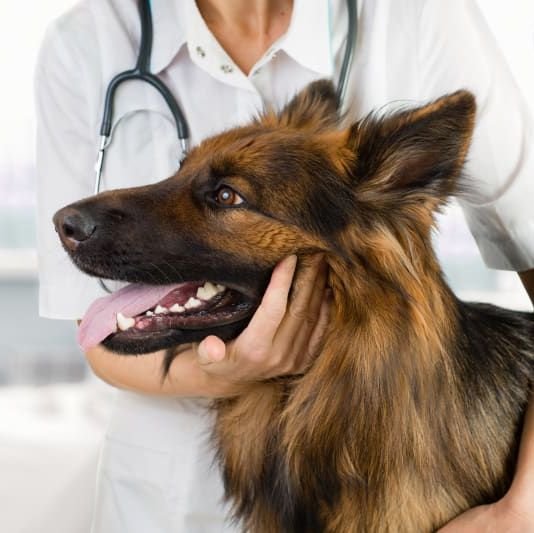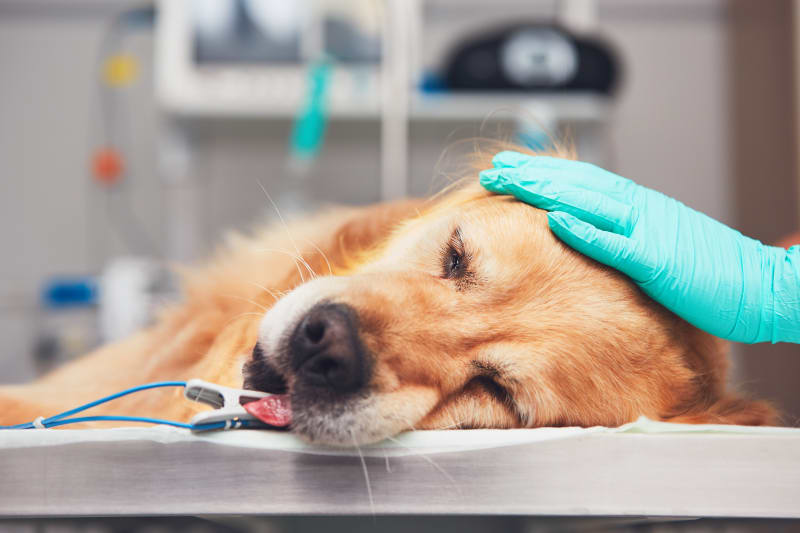
An intestinal or bowel blockage or obstruction is a fairly common occurrence in dogs, especially those prone to chewing on foreign objects, which, unfortunately, is typical in
most dogs. Eventually, as they pick up and chew on non-food items, they will ingest something that they shouldn’t and if it’s not vomited out, it can become caught in the GI system.
This prevents both food, as well as blood, from flowing normally and can cause serious issues – even death, if left untreated for long periods of time.
In almost all cases of blockage, hospitalization is required and usually, surgery is needed as well. The dog intestinal blockage surgery cost depends on the severity and location of the blockage, as well as several other factors.
Cost of Dog Intestinal Blockage Treatment and Surgery
The cost of treating an intestinal blockage in a dog can vary widely depending on the diagnostic process required to isolate the cause of the problem, the course of treatment recommended, and your pet’s aftercare requirements.
If your vet refers your dog to a specialist veterinary hospital for treatment, the cost is not necessarily higher. Also, vet fees can differ between geographical locations.
The total surgery cost to remove foreign object from a dog, including all the medical interventions, can run as much as $5,000 to $8,000, depending on the case and your location.
First veterinary visit and examination – Once an obstruction is suspected, either because you see your dog ingesting something that it shouldn’t, or you notice vomiting and lethargy, you should immediately get your animal to a veterinarian. A physical exam will be conducted and a history will be taken.
A basic physical exam will run the standard cost of a vet visit – around $50.
Radiographs – If an obstruction is suspected, the doctor will likely recommend an x-ray. An x-ray will cost about $150.
X-rays can not be used to discern certain foreign bodies from the anatomy, so an ultrasound would be preferred in some cases.
In some instances, the object can move through the body and be passed uneventfully with the aid of intravenous fluids, but this is not the norm. If symptoms begin to improve, then, follow-up x-rays to compare to the originals to determine if the object is mobile would be taken, as well as GI motility medications would be given.
Ultrasound scans – Ultrasonography is used in the diagnostic process, especially if the dog has swallowed a soft object that doesn’t show up clearly on X-rays. The cost of an abdominal ultrasound scan is around $300.
Blood and Urine panels – Your vet may decide to carry out blood and urine tests to rule out secondary problems and check your dog’s overall health. Bloodwork runs $80 to $250 depending on how extensive the tests are and iif a urinalysis is included. These tests will be required if surgery is needed.
Endoscopy – Your vet may use a scope to look into the digestive tract. The cost of an endoscopy procedure typically is around $800. If the object is small and located in the stomach, an endoscope may be able to remove it. In cases of intestinal blockage, however, this will likely not be possible.
Surgery – If abdominal surgery is required, as in most cases of blockages, the dog will need to be hospitalized for 2-4 days. A laparotomy is conducted where an incision is made in the abdomen and the object is extracted carefully.
Depending on the amount of time the object has been in the dog’s system, the bowel may also need repairing. If the intestines have been without blood supply for an extended period, they can die and in this case, the bowel will need a resection – meaning, that compromised portion is removed and the two new ends rejoined.
The surgery itself will run for about $1,000 to $4,000, depending on the type of object ingested, where in the GI system it ends up, and how much damage was done already.
Anesthesia – Invasive surgery will be carried out under general anesthetic. It is typically charged per 30 minutes; starting at the cost of around $85 for the first 30 minutes and incurring a further $70 charge for every 30 minutes of additional time that’s required to complete the procedure.
Intravenous fluids – Fluids meanwhile help maintain important electrolytes that are lost due to the blockage which prevents absorption of nutrients. IV fluids run around $75 to $100. This would need to be done while hospitalized, which runs around $150 to $300 per night.

Hospitalization – Your dog will require hospitalization for its operation and recovery period afterward. Hospitalization for a day typically costs around $50.
Medications – While this is ongoing, the dog will need medications as well as fluids to help maintain comfort and well-being. Vomiting, nausea, and pain are all associated with intestinal blockages, so controlling this with pain management drugs like gabapentin or tramadol, and anti-nausea medications like Cerenia are important.
Following the surgery, your dog will need to be on several medications still – including antibiotics to prevent infection, pain medications, and anti-nausea meds. These run around $80 to $150 depending on the specific drugs prescribed and the dosages.
Follow-up consultations – You will be asked to bring your dog back to the clinic for at least one follow-up consult so that the vet can check on your pet’s recovery and remove any stitches. This will occur 10-14 days after the surgery and the cost may already be included. If not, a re-check examination typically costs around $30.
Prognosis and Aftercare
Once the cause of the blockage is gone, your dog should make a good recovery.
When you take your pet home from the veterinary hospital, it will most likely be wearing an Elizabethan collar to prevent it from nibbling at its stitches. An Elizabethan collar costs about $15 to $40 depending on the size.
Your vet will probably give you some special food to give to your dog for a week or so while your pet recovers from the surgery like digestive care canned food which typically costs around $36 for a tray of 12 13-ounce cans.
Your dog’s exercise should be kept to gentle walks on the leash until its stitches can come out. Be sure to follow up with your veterinarian to make sure your dog is recovering well.
